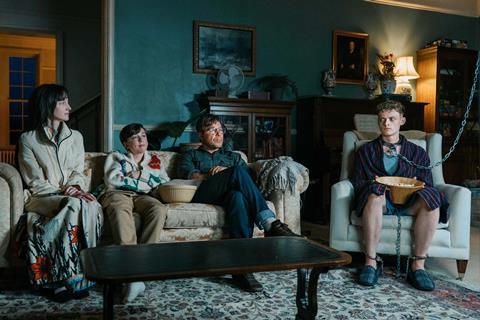The pair play a married couple determined to rehabilitate a wayward boy in Jan Komasa’s intriguing Toronto premiere

Dir: Jan Komasa. Poland/UK. 2025. 110mins
The imposing house in the English countryside hides a dark secret, as so many of them do; here, there’s a terrified 19-year-old lad imprisoned in the cellar, chained like a dog with a metal collar round his neck. From this familiar genre set-up, Good Boy, from Polish director Jan Komasa (Corpus Christi, Suicide Room), gradually reveals itself to be an entertainingly off-kilter tale of rage, rehabilitation and redemption, its often-outlandish twists and turns grounded by strong performances from Stephen Graham, Anson Boon and Andrea Riseborough.
Deliberately odd, carefully-calibrated neo-gothic fable
Having premiered in Toronto, Good Boy will next move to London and should attract attention for both its cast – particularly Graham, riding high on the success of Netflix international hit series Adolescence – and its intriguing premise. Theatrical play certainly isn’t out of the question, and it could attract audiences looking for smart psychological horror, although streaming may prove the better fit for a film that could generate solid word of mouth. The presence of Oscar-nominated filmmaker Jerzy Skolimowski (EO) as a producer may also pique further interest.
Tommy (Boon, a former Screen Star Of Tomorrow) is very definitely not a good boy. He spends his days tormenting kids and crashing cars in the name of social media content, and his nights on drugs- and alcohol-fuelled benders. It’s after one of these that he’s suddenly bundled into an anonymous car; when he wakes he’s in a basement, chained to the wall. Soon he meets Chris (Graham), who lives in the home with his wife Cathy (Riseborough) and young son Jonathan (Kit Rakusen). Softly spoken and seemingly mild-mannered, Chris doesn’t look like a psychopath, but nevertheless tells Tommy that he can’t leave. It becomes clear that this family are determined to make Tommy see the error of his ways by any means necessary.
Polish director Komasa is adept at telling stories of families and communities as places of both safety and suffocation, and he handles this narrative, from screenwriters Bartek Bartosik and Naqqash Khalid, with confidence, style and more than a little black humour. Originally intended to be set in Warsaw (where the film’s interiors were shot), a move to Yorkshire brings with it a suitably imposing country estate and the vast open spaces of the surrounding moors, which cinematographer Michel Dymek drinks in on the few occasions Tommy is able to venture outside.
He spends most of his time imprisoned in this lavish country pile, around which the pale, taciturn Cathy wafts like a spectre, the bubbly Jonathan – nicknamed Sunshine by his parents – tries a little too hard to please and edgy Macedonian housekeeper Rina (Monika Frajczyk) attempts not to give in to Tommy’s flirtations. In the basement, Tommy is forced to listen to anger management tapes, watch social media videos of his misdeeds. When he transgresses – uses foul language, refuses to apologise – he is punished. Initially defiant and unresponsive, Tommy gradually seems to start coming round; later, as a reward for his good behaviour, Chris builds a track and pulley system so that a still-chained Tommy can have full access to the house.
This is an exercise in psychology rather than out-and-out horror – there’s hardly any violence, although the threat of it is ever-present – and viewers are invited to draw their own conclusions. Chris and Cathy’s motivations remain ambiguous; there are hints of grief over a former inhabitant of the house, suggestions that they have done this before. Tommy is, admittedly, something of a cipher for disaffected, antisocial, entitled youth (Chris, somewhat ironically, admonishes Tommy’s entire generation for always ’playing the victim’), and there is some sympathy for those who would attempt to turn him into a better man, even if the methods are beyond the pale.
While the narrative is oblique in places, the performances are nailed down. Boon is full of swagger and fury as Tommy, who is used to coasting through life on his bravado and edgy charm, but shows hints of vulnerability beneath that belligerent surface. The film asks us to think about what kind of life he must have that Chris and Cathy’s unconventional care and affection begins to feel appealing.
Riseborough is commandingly enigmatic as the deeply troubled Cathy – given the setting, the Wuthering Heights link is obvious if not overstated – who wants nothing more than to take Tommy under her own broken wing, yet has moments of horrible, quiet cruelty. Graham plays Chris as a wolf in sheep’s clothing, a loving man who wants to make his family happy but whose controlling streak often gets the better of him.
There’s no doubt that Good Boy begins to run out of steam by film’s end; Rina’s storyline ends rather randomly and abruptly, while the film’s final scenes threaten to push an already fantastical premise into the absurd. Yet there’s something deeply compelling about this deliberately odd, carefully-calibrated neo-gothic fable, which suggests that rehabilitation can be found in the darkest of places, and that true freedom is simply a matter of trust.
Production companies: Skopia Film, Recorded Picture Company
International sales: HanWay Films info@hanwayfilms.com
Producers: Jeremy Thomas, Ewa Piaskowska, Jerzy Skolimowski
Screenplay: Bartek Bartosik, Naqqash Khalid
Cinematography: Michel Dymek
Production design: Fletcher Jarvis
Editing: Agnieszka Glinska
Main cast: Stephen Graham, Andrea Riseborough, Anson Boon, Kit Rakusen, Monika Frajczyk
























